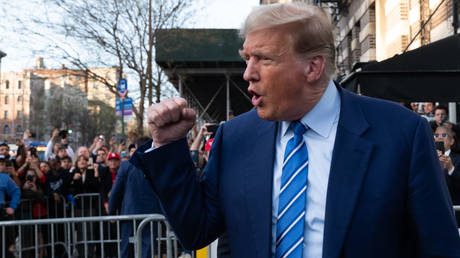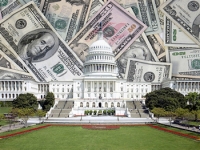Newsbud Exclusive-Trump’s Afghan War: Based on Neocon Lies.
 Standing before a podium at the Fort Myer military base in Arlington, Virginia, President Donald Trump addressed an audience of soldiers on August 21. Trump said the consequences of an exit from Afghanistan “are both predictable and unacceptable. 9/11, the worst terrorist attack in our history, was planned and directed from Afghanistan because that country was ruled by a government that gave comfort and shelter to terrorists. A hasty withdrawal would create a vacuum that terrorists, including ISIS and al Qaeda, would instantly fill, just as happened before September 11th.”
Standing before a podium at the Fort Myer military base in Arlington, Virginia, President Donald Trump addressed an audience of soldiers on August 21. Trump said the consequences of an exit from Afghanistan “are both predictable and unacceptable. 9/11, the worst terrorist attack in our history, was planned and directed from Afghanistan because that country was ruled by a government that gave comfort and shelter to terrorists. A hasty withdrawal would create a vacuum that terrorists, including ISIS and al Qaeda, would instantly fill, just as happened before September 11th.”
In order to believe this, facts must be put aside and the official version of events be unquestioningly accepted. There is no evidence the attack of September 11 was “planned and directed from Afghanistan.” Then Secretary of State Colin Powell said two weeks after the attack he would “in the near future… to put out… a document that will describe quite clearly the evidence that we have linking [Osama bin Laden] to this attack.”
However, the following day during a press conference in the Rose Garden with President Bush, Powell said the American people would not be permitted to see the evidence. He added the United States had irrefutable proof of bin Laden’s complicity, but “most of it is classified.” Powell’s remark was an effort to conceal the fact the Bush administration had no evidence Osama bin Laden planned and orchestrated the attack from a cave in Afghanistan. Investigative journalist Seymour Hersh cited officials from the CIA and the Justice Department as saying there was no solid evidence of this.
In 1998, following the US embassy bombings in Dar es Salaam, Tanzania, and Nairobi, Kenya, the Taliban government offered to turn over bin Laden, but the Bush administration refused. Wakil Ahmad Muttawakil, the Taliban foreign minister, told Al Jazeera his government had made several proposals to the United States to turn over the Saudi to stand trial.
“Even before the [9/11] attacks, our Islamic Emirate had tried through various proposals to resolve the Osama issue. One such proposal was to set up a three-nation court, or something under the supervision of the Organization of the Islamic Conference [OIC]," Muttawakil said. “But the US showed no interest in it. They kept demanding we hand him over, but we had no relations with the US, no agreement of any sort. They did not recognize our government.”
 After the Taliban made the proposals through the US embassy in Pakistan and an informal Taliban office at the UN in New York, the CIA station chief in Pakistan, Robert Grenier, dismissed the offer as a ploy. In mid-September 2001, Grenier had a secret meeting with Mullah Akhter Mohammed Osmani, considered the second-most powerful figure in the Taliban at the time, at a five-star hotel in the Pakistani province of Baluchistan. He said if the Taliban were serious about avoiding a US invasion, they would turn over bin Laden immediately for prosecution. Alternatively, as CIA Director George Tenet put it, the Taliban could “administer justice themselves, in a way that clearly [takes] him off the table,” in other words, the CIA wanted the Taliban to assassinate bin Laden.
After the Taliban made the proposals through the US embassy in Pakistan and an informal Taliban office at the UN in New York, the CIA station chief in Pakistan, Robert Grenier, dismissed the offer as a ploy. In mid-September 2001, Grenier had a secret meeting with Mullah Akhter Mohammed Osmani, considered the second-most powerful figure in the Taliban at the time, at a five-star hotel in the Pakistani province of Baluchistan. He said if the Taliban were serious about avoiding a US invasion, they would turn over bin Laden immediately for prosecution. Alternatively, as CIA Director George Tenet put it, the Taliban could “administer justice themselves, in a way that clearly [takes] him off the table,” in other words, the CIA wanted the Taliban to assassinate bin Laden.
The ultimatum was rejected by Taliban leader Mullah Omar. Following this, during a second meeting at a villa in Baluchistan, Grenier said Osmani should overthrow Omar and get rid of Osama bin Laden. This was also rejected. Osmani was later killed by a smart bomb during an attack by the US Air Force in Helmand Province.
The reclusive Omar had previously attempted to establish a dialogue with the United States. In response to an inquiry on bin Laden’s alleged terror activities prior to the September 11 attack, a cable sent by the United States to Omar stated: “We have detailed and solid evidence that Osama bin Laden has been engaged and is still engaged in planning, organizing, and funding acts of international terror.” The US did not provide supporting evidence to back up the accusation and this resulted in the Afghan supreme court acquitting bin Laden in October 1998.
 A few months earlier, in August 1998, President Bill Clinton ordered the bombing of a Sudanese pharmaceutical factory in retaliation for the embassy bombings in Kenya and Tanzania. The US insisted the al-Shifa factory in Khartoum “was actually a disguised chemical weapons factory” that produced VX nerve gas. British engineer Thomas Carnaffin, who worked as a technical manager during the plant’s construction between 1992 and 1996, told reporters he never saw any evidence of the production of an ingredient needed for nerve gas. The attack violated numerous articles of the Hague Conventions.
A few months earlier, in August 1998, President Bill Clinton ordered the bombing of a Sudanese pharmaceutical factory in retaliation for the embassy bombings in Kenya and Tanzania. The US insisted the al-Shifa factory in Khartoum “was actually a disguised chemical weapons factory” that produced VX nerve gas. British engineer Thomas Carnaffin, who worked as a technical manager during the plant’s construction between 1992 and 1996, told reporters he never saw any evidence of the production of an ingredient needed for nerve gas. The attack violated numerous articles of the Hague Conventions.
Moreover, the owner of the Shifa factory gave interviews in which he “emphatically denied that the plant was used for anything other than pharmaceuticals, and there was never persuasive evidence to contradict his assertion. At the same time, members of the administration retreated from claims they made earlier that Osama bin Laden had what [Defense Secretary William] Cohen called ‘a financial interest in contributing to this particular facility.’ It turned out that no direct financial relationship between bin Laden and the plant could be established,” writes Richard Bernstein in his book, Out of the Blue: A Narrative of September 11, 2001.
The factory was Sudan's largest commercial manufacturer of prescription drugs for both medical and veterinary purposes, producing 50 percent of the country's supply. “Probably the most important was an anti-diarrhea remedy. They also made drugs against TB and they brought in the basic stock for antibiotics,” Carnaffin explained. It was estimated the destruction of the plant resulted in the death of tens of thousands of Sudanese. [READ MORE]
*If you are a Newsbud Community Member, you must log in to view full content.
**If you are not yet a Newsbud Community Member, just click on "SUBSCRIBE" to view subscription enrollment options.


